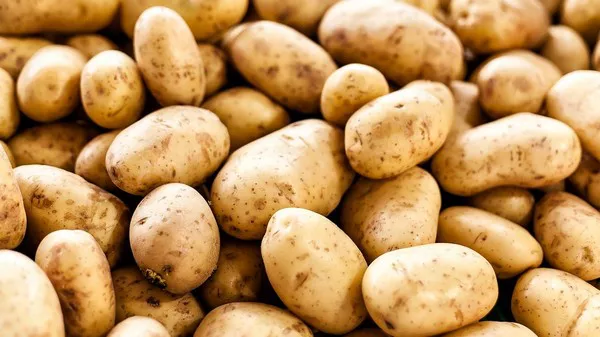In the realm of dietary management for diabetes, one of the most debated topics is the role of potatoes. Potatoes, often cherished for their versatility and widespread culinary use, present a unique set of challenges for individuals with diabetes. While they are a staple in many diets worldwide, their impact on blood sugar levels can be significant, making them a controversial food choice for diabetics. This article explores the reasons why potatoes might not be ideal for individuals managing diabetes, backed by scientific evidence and expert opinions.
Understanding Potatoes and Diabetes
Potatoes are a carbohydrate-rich vegetable that primarily contains starch, a complex carbohydrate composed of long chains of glucose molecules. When consumed, starches like those found in potatoes are broken down into glucose during digestion, leading to an increase in blood sugar levels. For individuals with diabetes, who already struggle to regulate their blood glucose levels, this rapid spike can be problematic.
The glycemic index (GI) is a measure that ranks foods based on how quickly and how much they increase blood sugar levels. Foods with a high GI, such as potatoes, cause a rapid spike in blood glucose levels after consumption. Boiled potatoes, for instance, have a high GI score, often comparable to or even exceeding that of table sugar. This rapid increase in blood sugar can challenge the body’s ability to maintain stable glucose levels, particularly for individuals with diabetes who have impaired insulin function or insulin resistance.
Impact of Potatoes on Blood Sugar
For diabetics, managing blood sugar levels is crucial to prevent complications and maintain overall health. Consuming foods that cause sharp increases in blood glucose can lead to hyperglycemia, which over time can contribute to diabetes-related complications such as nerve damage, cardiovascular disease, and kidney problems. Potatoes, especially when prepared in ways that increase their glycemic load, such as frying or mashing with added fats, can exacerbate these risks.
Research indicates that the form in which potatoes are consumed also affects their impact on blood sugar. For example, mashed potatoes or french fries typically have a higher GI than whole potatoes. This difference arises from how processing and cooking methods alter the structure of starches, making them easier and quicker to digest.
Nutritional Composition of Potatoes
While potatoes are often demonized for their impact on blood sugar, they do offer nutritional benefits. They are a good source of vitamin C, potassium, and dietary fiber, particularly when consumed with the skin. However, the high carbohydrate content outweighs these benefits in terms of managing blood sugar levels for diabetics.
In addition to carbohydrates, potatoes also contain resistant starch, a type of starch that resists digestion in the small intestine and behaves more like dietary fiber. Resistant starch has been shown to have potential benefits for glycemic control by moderating the rise in blood sugar levels after meals. However, the amount of resistant starch in potatoes varies depending on factors such as variety, cooking method, and storage conditions.
Practical Considerations for Diabetics
For individuals with diabetes, making informed decisions about food choices is essential. While potatoes can be included in moderation, it is crucial to consider portion sizes, cooking methods, and overall dietary balance.
Portion Control:
Managing portion sizes helps control the amount of carbohydrates consumed in a meal. Smaller portions of potatoes can help mitigate their impact on blood sugar levels.
Cooking Methods:
How potatoes are prepared significantly influences their glycemic impact. Boiling potatoes with their skins intact generally results in a lower GI compared to frying or baking them without skins.
Pairing with Other Foods:
Pairing potatoes with foods that have a lower GI, such as lean proteins, non-starchy vegetables, or healthy fats, can help slow down the digestion and absorption of carbohydrates, thereby reducing the glycemic response.
Monitoring Blood Sugar Levels:
Regular monitoring of blood glucose levels allows individuals with diabetes to understand how different foods, including potatoes, affect their metabolism and make adjustments to their diet accordingly.
Expert Opinions and Recommendations
Nutritionists and healthcare professionals often advise individuals with diabetes to prioritize foods with a lower GI to help manage blood sugar levels effectively. While potatoes can fit into a balanced diet for some people with diabetes, they should be consumed in moderation and with careful consideration of their overall dietary impact.
SEE ALSO: What Is Hot Cocoa Made of
Dr. Emily Chen, Registered Dietitian:
“Potatoes can be challenging for individuals with diabetes due to their high carbohydrate content and glycemic index. Moderation and portion control are key when including potatoes in the diet. Opting for boiled or roasted potatoes with skins on can help minimize their impact on blood sugar levels.”
Dr. Michael Wong, Endocrinologist:
“For my patients with diabetes, I recommend limiting high-GI foods like potatoes and focusing on a diet rich in vegetables, whole grains, lean proteins, and healthy fats. This approach helps stabilize blood sugar levels and reduce the risk of complications associated with diabetes.”
Conclusion
In conclusion, while potatoes are a beloved and nutritious vegetable, their impact on blood sugar levels makes them a challenging choice for individuals with diabetes. The high carbohydrate content and glycemic index of potatoes can lead to rapid spikes in blood glucose levels, which may contribute to difficulties in managing diabetes effectively. However, with careful portion control, thoughtful cooking methods, and in the context of a well-balanced diet, some individuals with diabetes may be able to enjoy potatoes in moderation.
Educating oneself about the glycemic index of foods, monitoring blood sugar levels, and consulting with healthcare professionals are essential steps in managing diabetes through diet. By making informed choices and understanding the nuances of carbohydrate metabolism, individuals with diabetes can optimize their dietary habits to support better health outcomes and overall well-being.
Related Topics:



























